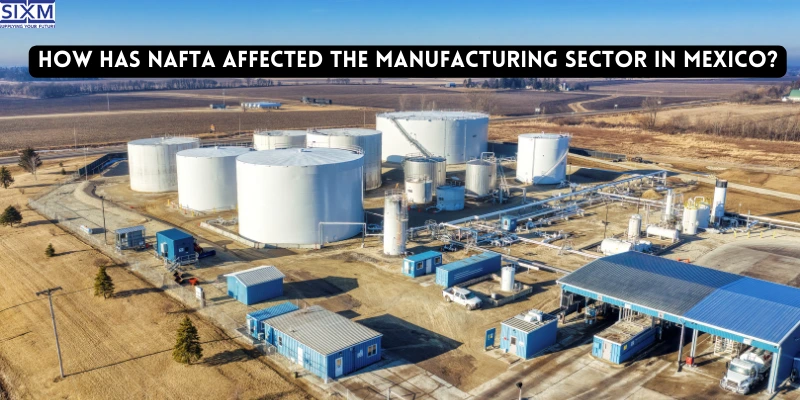
NAFTA established the first trade agreement between two developed nations and an emerging market in North America. The motives behind the agreement were diverse. It enabled the US and Canada to compete with rising markets like China and the European Union. Mexico, on the other hand, saw NAFTA as a chance to modernize its economy and align with the trans-pacific partnership. This blog post explores how NAFTA affected the manufacturing sector in Mexico.
How Has Nafta Impacted The Manufacturing Sector In Mexico?
After extensive discussions and intense negotiations among the US, Mexico, and Canada, NAFTA took effect in 1994. Prior to implementation, the Mexican public was assured that NAFTA would bring improved economic growth and prosperity, leading to more job opportunities for the working class. However, with the passage of time, the outcomes from the Mexican perspective have been mixed. If you also plan to step into the production industry of this growing market, look for our Mexico consulting services for manufacturing and get a smooth business plan.
The primary objective of NAFTA was to eliminate trade tariffs among member countries. After ten years, all such tariffs were eliminated. According to research published by the IMF, the agreement has been successful, evident from the increased trading volumes between Mexico, the US, and Canada from a macroeconomic standpoint.
Since 1994, trade between member states has surged by up to 400%. From Mexico's standpoint, the agreement transformed the country from having a highly protected and closed economy to one of the most open economies globally. This shift has had both positive and negative effects on the Mexican economy. Being experts, we provide consulting for multiple industries in Mexico.
From a manufacturing perspective, the impact of NAFTA on Mexico has generally been positive. Following the agreement's signing, a list of manufacturing companies in Mexico has tremendously crossed the set bar.
As a result, manufacturing exports, which accounted for 8.5% of Mexico's gross domestic product, increased to 36.95% by 2013. Despite claims that NAFTA led to the loss of 44,000 domestic manufacturing jobs, Mexico has actually created over 500,000 jobs through significant foreign investments
However, the wages of direct factory workers have remained stagnant since NAFTA's inception in 1994, despite the influx of manufacturing jobs. The highest wage increases have been observed in upper and middle-level management positions, which were previously occupied by foreigners but are now held by Mexicans.
These workers now receive compensation similar to their counterparts in the United States. Additionally, it is worth noting that in 2016, the automotive industry accounted for 3.1% of Mexico's GDP.
Benefits Of NAFTA To the Mexican Production Industry
-
Increased Foreign Direct Investment
NAFTA has attracted significant foreign direct investment (FDI) in Mexico's manufacturing sector. With reduced trade barriers, international companies have established production facilities in Mexico to take advantage of lower labor costs and proximity to the U.S. market.
-
Expansion of Export-Oriented Industries
NAFTA has stimulated the growth of major industries in Mexico. The agreement eliminated tariffs on most goods traded between Mexico, the United States, and Canada, enabling Mexican manufacturers to access a much larger market and boost their exports.
-
Integration into Regional Supply Chains
Mexico is famous for regional supply chains due to NAFTA. The agreement encouraged cross-border production sharing, with manufacturers in Mexico specializing in certain components or processes that contribute to the overall production of finished goods in North America.
-
Job Creation and Economic Growth
NAFTA has contributed to job creation and economic growth in Mexico's manufacturing sector. The increased investment and expansion of export-oriented industries have led to the creati
-
Challenges and Displacement
While NAFTA has brought significant benefits, it has also posed challenges for certain segments of the manufacturing sector. Some domestic industries have struggled to compete with imported goods, leading to job displacement and the need for industry restructuring and adaptation.
-
Technological Advancements and Innovation
To remain competitive under NAFTA, Mexican manufacturers have embraced technological advancements and innovation. This United States-Mexico-Canada(USMCA) agreement has spurred the adoption of advanced manufacturing practices, such as automation, robotics, and digitalization, to enhance productivity and efficiency.
Final Thoughts
In conclusion, NAFTA has had a multifaceted impact on the manufacturing sector in Mexico. It has attracted foreign investment, promoted export-oriented industries, integrated Mexico into regional supply chains, created jobs, and stimulated technological advancements. However, it has also presented challenges that require ongoing adaptation and investment in human capital and innovation.

